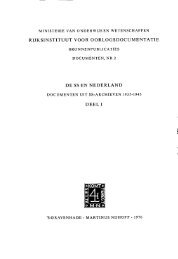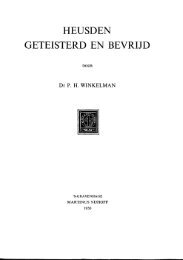De razzia van Rotterdam. 10-11 november 1944 - KNAW
De razzia van Rotterdam. 10-11 november 1944 - KNAW
De razzia van Rotterdam. 10-11 november 1944 - KNAW
Create successful ePaper yourself
Turn your PDF publications into a flip-book with our unique Google optimized e-Paper software.
270 SUMMARY<br />
The bills were handed over to the people or put into the letterbox. Sometimes this<br />
was followed by the appearance of a loudspeaker car which also announced the<br />
areas where the men had to assemble. In other areas the loudspeaker <strong>van</strong> appeared<br />
first and the distribution of the handbills only took place afterwards.<br />
The German order made a considerable impression. The threats that those at-<br />
tempting escape or offering resistance would be shot at was printed in heavy black.<br />
Special attention was directed to the promise that every day good food and tobacco<br />
would be issued and that people who reported would be paid five guilders a day.<br />
It was also important that those in possession of exemption papers were told to bring<br />
them with them. This seemed to indicate that a distinction was to be made and those<br />
who did possess an exemption paper or who hoped to be able to get one at the last<br />
moment, still had a glimmer of hope that they might be allowed to remain in <strong>Rotterdam</strong>.<br />
Many people reported in the expectation of soon being free again. There was<br />
a run on general practitioners and specialists for statements on account of which<br />
the holder might obtain an exemption.<br />
In these moments of tension all sorts of suspicions arose. Nobody knew what was<br />
really happening. It was clear that one would be taken away and that one had to<br />
take along food for one day. <strong>De</strong>stinations were unknown. Some thought that, as had<br />
already happened, people would be forced to dig fortifications in the neighbourhood<br />
of <strong>Rotterdam</strong>, others believed they would be sent to the eastern province of Drente<br />
in order to dig potatoes. These and similar assumptions were made because many<br />
people failed to realize the seriousness of the situation or were unable to make up<br />
their minds.<br />
In many cases the Germans on entering the streets fired shots or aimed their guns<br />
at windows and doors. In such circumstances any will to resist was quickly broken.<br />
People reported or allowed themselves to be taken out of their homes simply<br />
because of the danger of otherwise losing their lives.<br />
In other cases no Germans appeared in the Street, but there was the noise of firing<br />
drawing attention to the threats contained in the German order. Many families un-<br />
nerved by the tremendous uncertainties were convinced that people had been shot<br />
in other streets. Again the will to resist was broken and one after another the men<br />
left their homes.<br />
The shots or the hearing of shots were not always the main reason for complying<br />
with the German order. In many cases men reported, because they had no possibility<br />
for hiding, nor had they the means for remaining hidden for a long time. They were<br />
afraid of risking the lives of their women and children by staying indoors or going<br />
into hiding elsewhere. The women on their part sometimes exerted pressure on their<br />
men to leave in order not to endanger the children or themselves. Words were not<br />
always needed. The women started to pack a suitcase or a rucksack and this was often<br />
enough silently accepted by the men, who thus followed the way of least resistance.<br />
It often happened that children were forced by their parents to leave.<br />
In other cases people’s first reaction was to start to hide. Later on they decided






